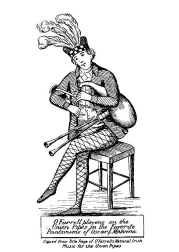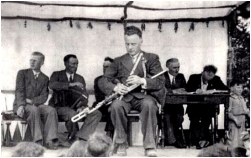










 The Pipes
The PipesThe history of piping in Ireland spans some thirteen centuries, the earliest references found in the ancient law tracts and annals. Some high crosses have carved depictions of early pipes (10th Century) and from the 15th Century onwards the references become more frequent. Before the 18th century all references to pipes relate to mouth-blown instruments. The distinctively Irish form of bagpipe, the Union or Uilleann Pipes, is believed to have originated about the beginning of the 18th Century, although no exact source of development has been found. It is thought the name 'Union Pipes' refer to the union of sound produced by Chanter, Drones, and Regulators. Furthermore, the word 'Union' can probably be attributed to a corruption of the Irish word 'Uilleann' which means elbow, and compliments the change from mouth blown pipes to bellows driven pipes, the bellows being powered by the elbow. The present form of the Uilleann Pipes, with the drones and three regulators, came into being at the beginning of the 19th century.  There are a number of fine sets surviving from the mid 18th century onward. Most of these sets are pitched in low keys like B and B flat.
Piping was at its height in pre-famine Ireland (pre 1847) and was not confined to any social stratum.
It was deemed a highly respectable profession in Ireland due to the peoples demand for music, dancing and entertainment in general.
It is interesting to note that many of these pipers were blind; piping gave them a respectable way to earn a living, one not impinged by their handicap.
Social changes in the second half of the century, primarily those of emigration and death, led to a decline in piping and by the beginning of the 20th century,
the last of the professional travelling pipers in Ireland were mostly destitute, finding refuge in the workhouses.
Thankfully, due to the admirable efforts and aid of the Gaelic League, the Feis Ceoil and various pipers' clubs, the 20th century saw the revival of the Uilleann Pipes.
Today, this instrument is played by people all over the world and long may this continue...
There are a number of fine sets surviving from the mid 18th century onward. Most of these sets are pitched in low keys like B and B flat.
Piping was at its height in pre-famine Ireland (pre 1847) and was not confined to any social stratum.
It was deemed a highly respectable profession in Ireland due to the peoples demand for music, dancing and entertainment in general.
It is interesting to note that many of these pipers were blind; piping gave them a respectable way to earn a living, one not impinged by their handicap.
Social changes in the second half of the century, primarily those of emigration and death, led to a decline in piping and by the beginning of the 20th century,
the last of the professional travelling pipers in Ireland were mostly destitute, finding refuge in the workhouses.
Thankfully, due to the admirable efforts and aid of the Gaelic League, the Feis Ceoil and various pipers' clubs, the 20th century saw the revival of the Uilleann Pipes.
Today, this instrument is played by people all over the world and long may this continue...
Source: Na Piobari Uilleann |
||